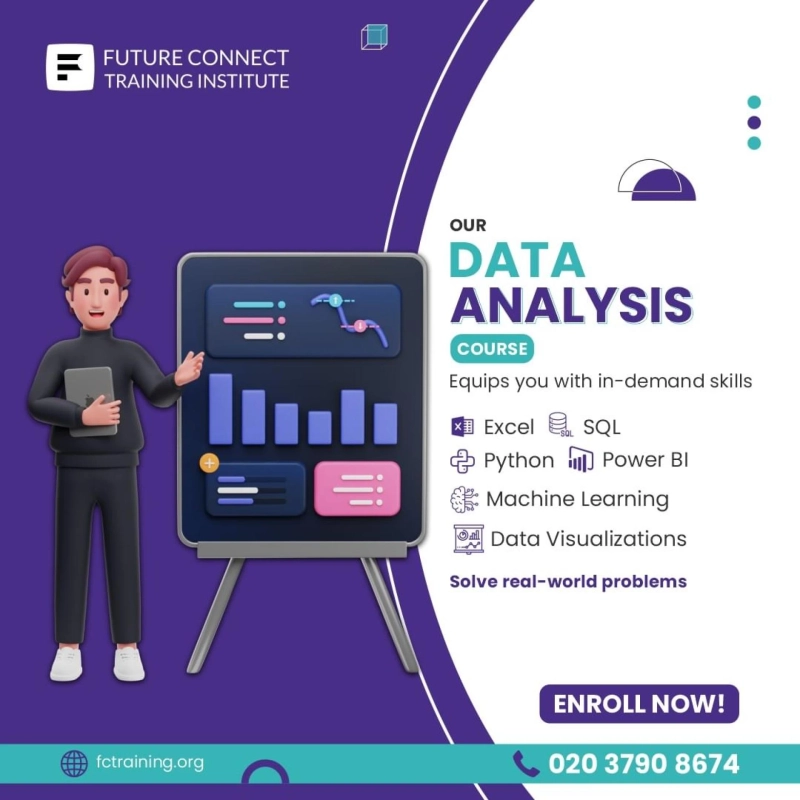In the realm of data management, Structured Query Language (SQL) stands as a fundamental tool for interacting with and managing relational databases. Recognizing the significance of SQL proficiency in today's data-driven world, Future Connect Training offers a comprehensive SQL course tailored to meet the demands of aspiring data professionals. In this detailed exploration, we delve into what learners can expect from Future Connect Training's SQL course, encompassing its curriculum, learning outcomes, teaching methodologies, and frequently asked questions.
Course Overview:
Future Connect Training's SQL course is meticulously designed to equip learners with the essential skills and knowledge needed to proficiently navigate and manipulate relational databases using SQL. Through a blend of theoretical concepts and hands-on practical exercises, the course empowers participants to harness the power of SQL for data querying, manipulation, and management tasks.
Course Curriculum:
The curriculum of Future Connect Training's SQL course is structured to provide a comprehensive understanding of SQL, covering both fundamental and advanced topics. The key components of the curriculum include:
Introduction to SQL: Understanding the fundamentals of SQL, including its history, syntax, and basic commands.Database Design and Management: Exploring the principles of database design, normalization, and the creation, modification, and deletion of database objects.Data Querying: Mastering the art of retrieving data from databases using SELECT statements, filtering, sorting, and joining data from multiple tables.Data Manipulation: Learning how to insert, update, and delete data in relational databases.Advanced SQL Concepts: Delving into advanced SQL concepts such as subqueries, views, stored procedures, and transactions.Performance Optimization: Strategies for optimizing SQL queries and enhancing database performance.Practical Projects: Applying SQL skills to real-world scenarios through hands-on projects and case studies.Learning Outcomes:
Upon completion of Future Connect Training's SQL course, learners can expect to achieve the following outcomes:
Proficiency in writing SQL queries to retrieve, manipulate, and manage data in relational databases.Competence in database design principles, including normalization and the creation of efficient database structures.Ability to leverage advanced SQL features such as subqueries, views, and stored procedures for complex data operations.Aptitude in optimizing SQL queries and database performance for enhanced efficiency.Practical experience through hands-on projects, enabling the application of SQL skills to real-world scenarios.Teaching Methodologies: Future Connect Training employs a variety of teaching methodologies to ensure an engaging and effective learning experience for participants in its SQL course. These methodologies include:
Interactive Lectures: Engaging lectures delivered by experienced instructors, covering theoretical concepts and practical examples.Hands-on Exercises: Practical exercises and assignments designed to reinforce learning and enhance practical skills.Case Studies: Real-world case studies and projects that enable learners to apply SQL skills to solve practical problems.Group Discussions: Collaborative discussions and group activities to foster peer learning and knowledge sharing.Online Resources: Access to online resources, including video tutorials, reading materials, and practice exercises, to supplement classroom learning.Frequently Asked Questions (FAQs):
Is any prior experience required to enroll in the SQL course? No prior experience is required to enroll in the SQL course. The course caters to beginners and individuals with basic knowledge of databases.
What software/tools are used in the course? The course primarily utilizes popular relational database management systems (RDBMS) such as MySQL, PostgreSQL, or Microsoft SQL Server for practical exercises and projects.
Can I access course materials online? Yes, course materials including lecture slides, practice exercises, and additional resources are accessible online through Future Connect Training's learning management system (LMS).
Are there any prerequisites for the certification exam? While there are no specific prerequisites for the certification exam, it is recommended that learners complete all course modules and practice extensively to ensure readiness for the exam.
Is certification provided upon completion of the course? Yes, participants who successfully complete the SQL course, including all assignments and assessments, will receive a certification of completion from Future Connect Training.
What career opportunities can this course lead to? Proficiency in SQL opens doors to various career opportunities in data analysis, database administration, business intelligence, and software development.
Can I get assistance after completing the course? Yes, Future Connect Training provides post-course support and assistance to learners, including career guidance, job placement assistance, and access to alumni networks.
In conclusion, Future Connect Training's SQL course offers a comprehensive learning journey encompassing theoretical concepts, practical skills, and real-world applications. Through expert instruction, hands-on practice, and valuable resources, participants can expect to gain the knowledge and confidence needed to excel in the dynamic field of data management and analysis.


